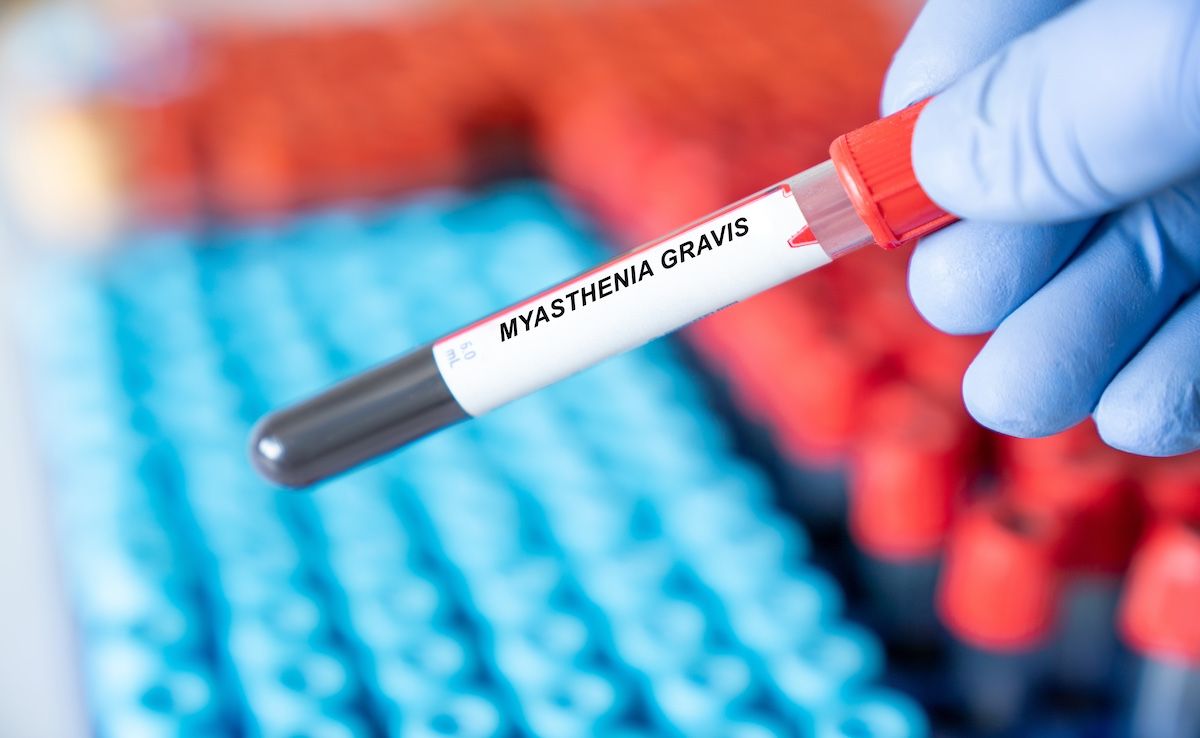- Center on Health Equity & Access
- Clinical
- Health Care Cost
- Health Care Delivery
- Insurance
- Policy
- Technology
- Value-Based Care
AChR-Ab Titers Associated With Myasthenia Gravis Severity
Anti-acetylcholine receptor antibody (AChR-Ab) titers and the AChR-Ab rates of change correlated with myasthenia gravis disease severity scores in a recent study.
Using anti-acetylcholine receptor antibody (AChR-Ab) titers to predict myasthenia gravis severity and improvement is controversial, but there was a correlation between decreased AChR-Ab titer and myasthenia gravis symptom scores in a recent study published in Frontiers in Neurology.1
AChR-Ab titers and the AChR-Ab rates of change correlated with myasthenia gravis disease severity scores in a recent study. | Image credit: luchschenF - stock.adobe.com

AChR-Abs, which impact the communication between nerves and muscles, are commonly found in patients with myasthenia gravis via a blood test.2 However, the relationship between AChR-Ab titer and clinical myasthenia gravis symptoms is not clear, the study authors explained.1
“The debate over the clinical significance of continuously monitoring AChR-Ab titers and using changes in antibody levels to assess patient responses to treatment persists. On one hand, some studies indicate that titer changes do not correlate with improvements in disease severity,” the authors wrote. "...On the other hand, numerous studies have suggested a relationship between changes in AChR-Ab titers and improvements in clinical symptoms.”
The prospective study included 62 patients with generalized myasthenia gravis who were positive for AChR-Ab. Researchers measured AChR-Ab titers, the Myasthenia Gravis Foundation of America quantitative myasthenia gravis score (QMGS), and myasthenia gravis activities of daily living scale (MG-ADL) scores prior to treatment initiation and at 3 and 6 months into treatment.
There was no correlation between AChR-Ab titer and age, gender, MGFA classification, duration of illness, or thymic abnormalities at baseline, but decreased AChR-Ab titers at 3 and 6 months vs baseline were significant (P = .001 and P < .001, respectively). The difference between 3 and 6 months was not significant after Bonferroni correction for multiple comparisons, however (P = .129). This finding indicates that the main decline in antibody titers was within 3 months from treatment initiation.
The decreasing trend in AChR-Ab titers correlated with reductions in QMGS scores (ρ = .187, P = .012) and ADL scores (ρ = .241, P < .05), and there was a high correlation between improving QMGS and ADL scores (ρ = .902, P < .001).
“These results suggest that the downward trend in AChR-Ab titers is consistent with the improvement in QMGS and ADL scores, with a stronger association with ADL scores,” the authors wrote.
At 6 months, there was an association between AChR-Ab titer changes and ADL score changes, and at 3 months, the AChR-Ab titer rate of change was correlated with the ADL rate of change.
“We found that, after initiating standardized treatment in [patients with myasthenia gravis], decreases in AChR-Ab titers coincided with decreases in QMGS and ADL scores, indicating that the decrease in AChR-Ab antibody titers correlates with improvements in clinical symptoms and enhanced self-care capabilities in patients,” the authors wrote. “Moreover, the primary decrease in AChR-Ab titers occurred within the first 3 months of treatment.”
Based on the study's findings, the authors recommend monitoring AChR-Ab titers at critical follow-ups such as 3 and 6 months post-treatment in patients with myasthenia gravis.
“Although AChR-Ab titers may not serve as markers of disease severity, the trend of decreased AChR-Ab titers after treatment initiation consistently aligns with reductions in QMGS and ADL scores,” the authors concluded. “Additionally, the rate of change in AChR-Ab titers correlates with changes in ADL scores after 3 months of treatment; at 6 months, the change in AChR-Ab titers correlates with changes in ADL scores.”
References
1. Luo L, Zhu X, Wen C, et al. Exploring the clinical significance of anti-acetylcholine receptor antibody titers, changes, and change rates in Myasthenia Gravis. Front Neurol. Published online January 15, 2025. doi:10.3389/fneur.2024.1506845
2. Acetylcholine receptor antibody (blood). University of Rochester Medical Center. Accessed February 21, 2025. https://www.urmc.rochester.edu/encyclopedia/content?contenttypeid=167&contentid=acetylcholine_receptor_antibody_blood
Quality of Life: The Pending Outcome in Idiopathic Pulmonary Fibrosis
February 6th 2026Because evidence gaps in idiopathic pulmonary fibrosis research hinder demonstration of antifibrotic therapies’ impact on patient quality of life (QOL), integrating validated health-related QOL measures into trials is urgently needed.
Read More
